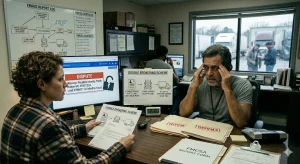Technology is advancing faster than laws, and some issues remain unclear. What happens if they crash? Who is responsible? How are they protected from cyberattacks? How will they handle roads where people drive poorly?

Autonomous trucks promise to revolutionize the freight transport industry by reducing costs and increasing efficiency. However, their implementation raises multiple questions that still lack clear answers. Here are ten of the most pressing concerns:
Who is responsible in case of an accident?
If an autonomous truck crashes, is the manufacturer, the software developer, the remote operator, or the truck owner at fault? Current legislation has not fully defined this issue.How will system failures be handled?
If the truck’s software malfunctions or crashes while on the road, what protocols are in place to prevent an accident or delivery disruption?What happens if they lose GPS signal?
Many autonomous trucks rely on GPS for navigation. If the signal is lost due to interference or satellite failure, will the truck stop immediately, or will it continue operating autonomously?How will they respond to extreme weather conditions?
Snow, dense fog, and heavy rain can affect sensors and cameras. Are these vehicles equipped to operate safely in all weather conditions?How will they interact with human drivers?
On roads filled with vehicles driven by people of varying experience levels, will autonomous trucks be able to anticipate and respond to unpredictable behavior?

What cybersecurity measures exist to prevent hacking?
Autonomous trucks could be vulnerable to cyberattacks. What security systems are manufacturers implementing to prevent digital hijacking?How will their circulation be regulated across different countries and states?
Each country has different freight transport regulations. Are there international agreements in place to allow autonomous trucks to cross borders without legal complications?What will be the impact on jobs in the industry?
Autonomous trucks could eliminate thousands of truck driving jobs. How will this transition be managed, and what alternatives will affected workers have?How will roadside emergencies be handled?
If an autonomous truck experiences a mechanical failure or is involved in an accident, how will it alert emergency services, and how will they be able to intervene efficiently?What will be the real cost of adoption?
Although they promise long-term operational cost reductions, the initial investment in autonomous trucks, infrastructure, and maintenance could be very high. Will transport companies be able to afford this expense without affecting their rates and services?

Double Brokering in 2026: How the Scam Works and How to Protect Your Freight
Double brokering fraud is one of the fastest-growing threats in the U.S. trucking industry in 2026. From ghost brokering to email hacking and identity theft,

Middle East Conflict: Impact on Diesel Prices and What U.S. Truckers Should Expect
The escalation of conflict in the Middle East has pushed crude oil prices toward $80 per barrel, reigniting global energy volatility. For the U.S. trucking

The best roadside attractions for truckers in the U.S.
America’s highways hide unique places that break up the routine, don’t hesitate to check out these roadside attractions along the way. The road is much

The trucker style: comfort, function, and identity
Truckers’ style is much more than workwear; it’s an identity. These are the most commonly worn garments among truckers. Truckers’ style is much more than

Chaos on Highway 61: Viral Wrong-Way Truck Video Reignites the CDL Debate
An 80-ton tractor-trailer traveling miles in the wrong direction on Missouri’s Highway 61 has reignited a nationwide debate over Commercial Driver’s License (CDL) standards, training

How technology affects driver retention
Friend or foe? 52% of drivers say technology directly influences their decision to stay with or leave a fleet. Fleet telematics company Platform Science published
